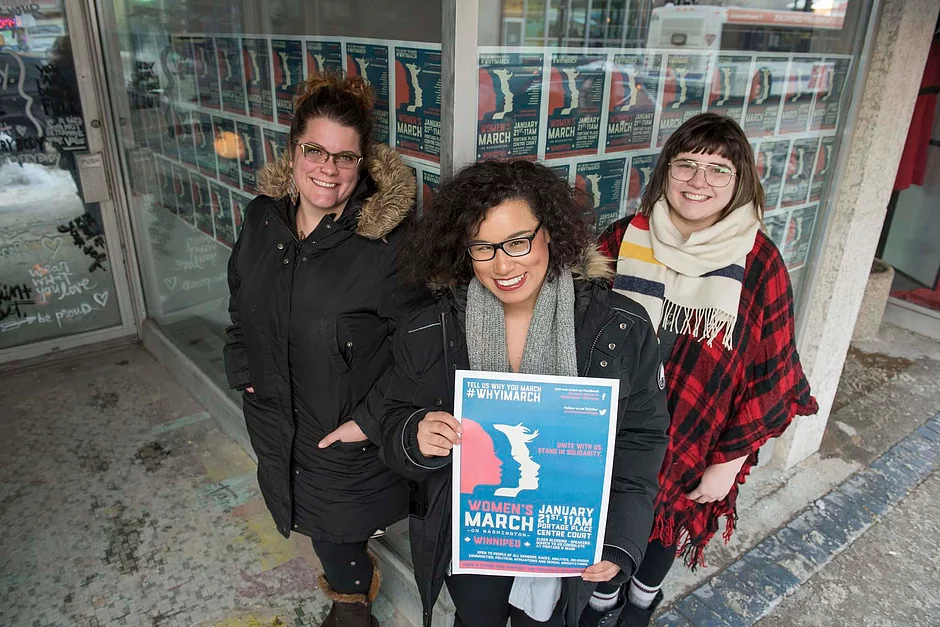Women's March about much more than Trump

Thank you to the Winnipeg Free Press for their coverage of the Women's March on Washington. Check out the original article by Jen Zoratti published on January 18, 2017.
On Saturday, the day after Donald Trump’s presidential inauguration, more than 200,000 people are expected to march in Washington, D.C., as part of the Women’s March on Washington.
And the event goes beyond America’s capital. More than one million people are also expected to attend sister events taking place all over the world, including right here in Winnipeg.
The Women’s March on Washington has been framed as an anti-Trump rally. But it’s bigger than that — and it’s bigger than him. The Trumps of the world are not created in a vacuum. People will be speaking and marching for everything from ending racial profiling and police brutality to reproductive access and childcare, to name just a few of the issues on the table. The reasons for marching are as diverse as the people attending, but everyone in attendance will be united by a common belief: that women’s rights are human rights.
"I’m definitely hoping that people know we don’t want to focus on Trump so much," says Alexa Potashnik, who will be emceeing the Winnipeg march. "I know it’s been shaped that way in the States, which is fine and obviously important, but it’s something to bring women together, especially women affected by marginalization — so Indigenous women, women of colour, women affected by poverty, by disability... We’ve heard enough about Trump."
(Amen to that.)
Potashnik, 23, is no stranger to community organizing and activism. In addition to serving as the racialized student Commissioner with the Canadian Federation of Students-Manitoba, she is the founder of Black Space Winnipeg, a grass-roots community organization that advocates for Winnipeg’s Black community.
Black Space is an organizing partner for Saturday’s march, along with CUPE Local 2348, Immigrant and Refugee Community Organization of Winnipeg, Women’s and Gender Studies Student Association (University of Manitoba), University of Manitoba Students’ Union, Winnipeg Labour Council and Women’s Health Clinic. More than 30 other local groups have also signed on as supporting organizations.
The march itself begins at 11 a.m. at Centre Court at Portage Place. After a program of speakers, the march will travel to Portage and Main and return to Portage Place. Everyone is encouraged to attend and share why they’re marching on social media using the hashtag #WhyIMarch.
As in D.C., Winnipeg’s march will have a strong focus on intersectionality, centring and amplifying the voices and experiences of women from marginalized communities. Intersectionality is a term coined by civil rights advocate and critical race theorist Kimberlé Williams Crenshaw that refers to the ways social identities and systems of oppression, discrimination and domination intersect. After all, many people can (and do) experience multiple forms of discrimination — racism, sexism, classism, homophobia, transphobia, ableism, bigotry — simultaneously. Discrimination can be overt, manifesting as ugly, hateful slurs and violence. But discrimination can be subtle, too, quietly imbedded in everything from health care policies to hiring practices.
That’s why Canadians and women from all over the world are marching in Washington and organizing sister marches of their own. Oppression and discrimination are not problems unique to the U.S. Neither are leaders such as Trump.
"I think there’s a common misconception that Canada is of equal rights, a mosaic, that we’re friendly, that we’re better," Potashnik says. "We’re not better. We’re just quieter. We’re much more polite about our ignorance and prejudice." As she also points out, racists and sexists are not always easy to spot and label as "bad." Sometimes, they are our family and friends.
To that end, Saturday’s marches will be educational opportunities open to anyone who wants them. For many folks in attendance, they will largely be about listening. For others, they will be about opening up and furthering critical dialogues on race, gender, privilege, inequality and how all of those things overlap.
History will doubtlessly be made on Jan. 21, but these marches are just the beginning. My hope — and I do have hope — is that people leave these events with their hearts, eyes and minds opened, energized and empowered to affect change in their own communities.
How we move forward — all of us, together — is entirely up to us.
[email protected]
Twitter: @JenZoratti
Read more by Jen Zoratti @ the Winnipeg Free Press.